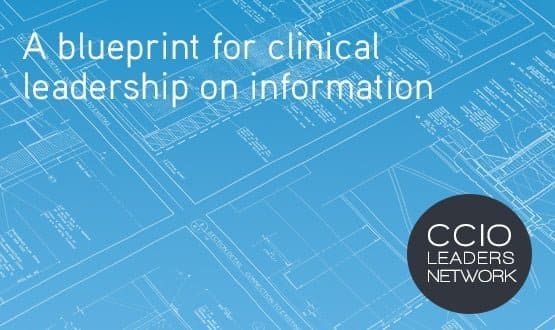A blueprint for clinical leadership on information
- 23 January 2014

For the past two and a half years, the chief clinical information officer movement has focused on calling for the appointment of CCIOs across the NHS.
It has argued this is an essential part of effectively harnessing IT systems and changing clinical practice, and it has been successful because it has been able to articulate a message that has struck a chord with clinicians.
Many have been frustrated by the scarcity of opportunities to lead on clinical information projects, or by lack of recognition for what they are already doing. Clinical information leadership has for far too long been a very ad hoc role.
Through networking events, working with partners and campaigning, the CCIO cause has made very considerable strides. There are now more than 50 CCIOs in place and 2,500 members of the wider CCIO Leaders Network.
To date, the CCIOs in place have most often been at the forefront of large implementation projects. The real work often really starts after go-live, when clinical practice can begin to be changed.
It takes a special kind of leader to persuade peers to trust them by taking steps into the unknown. The CCIO role is a complex and challenging one, acting as a trusted bridge between clinical, management and IT domains, able to speak with each with credibility.
But as more of the English NHS begins to have rich data available from clinical information systems, there is a growing need for strong local leadership on the quality of clinical data. CCIOs are best placed to take on the role, as part of joined-up leadership on both clinical IT and the quality of clinical data.
The new Vision and 12-point plan sets out the case for CCIOs to take on these twin roles and provides a blue-print for how they should become embedded within the new NHS regulatory and quality frameworks.
Specific actions to improve data quality are recommended for the Care Quality Commission, NICE, NHS England, the health secretary, the Department of Health and Health Education England in the key areas of regulation, commissioning, incentives, quality reporting and education and training.
Taken together, the points in the 12-point plan provide a roadmap for empowering CCIOs to become the clinical leaders charged with responsibility for ensuring clinical information quality within their organisation.
The 12-point plan for clinical information reads as follows:
The renewed commitment from the Department of Health and NHS England to improving information systems in the NHS is welcome.
However, the importance of rapid delivery should not override the need for clinical leadership. Indeed, without high quality clinical leadership, ambitions for an information-led NHS will fail. It is therefore vital that the quality – as well as delivery – of information is included in every aspect of the NHS.
Regulation
Following the Francis Report, there has been a renewed and welcome emphasis on the role of quality regulation, including the appointment of chief inspectors for hospitals, primary care and social care. However, inspection can only be effective if it is based on the right information. In order to support this:
1. The Care Quality Commission should include information quality measures in its inspection criteria for all providers of health and social care.
2. The appointment of a senior responsible clinician for information should be seen as one way of an organisation demonstrating its commitment to information quality.
Commissioning
Commissioning should be a key driver in NHS quality improvement. However, effective commissioning on the basis of quality is only possible if the right information is available.
Commissioning also has a role to play in ensuring that the correct information is collected and used on the first place. In order to support this:
3. NICE should produce a cross-cutting quality standard on clinical information, establishing core standards and metrics for the collection and use of information.
4. NHS England should integrate these standards into the Standard Contract for NHS services. The Standard Contract should make clear that all clinical information supplied by providers should be overseen by a lead clinician with responsibility for information quality.
5. NHS England’s work on the future of primary care and urgent care services should make clear the importance of clinical leadership on information, establishing core common standards across both sectors.
6. The Secretary of State for Health should make clear that ensuring the collection of high quality data is an essential prerequisite for commissioners in fulfilling their statutory duty to promote research.
Incentives
Financial incentives are an important driver of health service behaviour. However, intelligent incentives which reward improvements in quality can only be designed and implemented with timely access to the right clinical information. In order to support this:
7. NHS England should make clear in its fundamental review of incentives that high quality information is an essential prerequisite for incentives but that incentives can also play a role in encouraging the development of high quality information.
8. Quality assurance of information should be made a pre-qualifier for incentives such as CQUIN payments. This could be achieved by a clinician with lead responsibility for information within a commissioner agreeing that information is of a suitable quality.
9. CQUINs (or their equivalent) should be used to incentivise the collection of new or developmental data sets as part of integrated information systems. Once an information source is established, it should be viewed as a core requirement of any contract.
Quality reporting
High quality care for all made clear that the way in which providers of NHS services account for the quality of their care can be an important driver of quality improvement itself. However, reporting will only be effective if it is based on information which is relevant to patients, the public or commissioners. In order to support this:
10. The Department of Health should update guidance on quality accounts, in line with the findings of the ‘Keogh 14’ review. It should be mandatory for providers to report on the quality of their data and all accounts should be signed-off by a senior clinician with responsibility for clinical information.
11. The Department of Health should involve clinicians and patients in identifying the mandatory quality measures which will be of most use to them.
Education and training
Our vision is based on clinicians providing leadership for information policy and delivery.
However, at present, little emphasis is placed on the importance of high quality clinical information within medical and other clinical training. In order to address this:
12. Health Education England should establish clinical information as part of the curricula for all clinicians.
What next?
Taken together the CCIO vision and 12-point plan is a deliberately ambitious plan designed to further develop CCIOs and equivalent clinical information leaders, and place them in the driving seat on information quality and accountability.
Not every CCIO will want the additional responsibilities and not inconsiderable accompanying professional risks. Those that do have an opportunity to once again trail a path and help ensure that as well as clinical information technology meeting the needs of clinicians it is delivering demonstrable improvements to the quality of patient care and improved outcomes.
The plan provides the basis for much of the work of the CCIO Leaders Network in 2014 and beyond. There is already strong interest being shown from national bodies to find out more.
In the first instance the Care Quality Commission, NICE, NHS England, Department of Health and Health Education England have all been written to on the plan, as have all of the Royal Medical Colleges.
Further launch activities and events will follow. Everyone interested in the development of the CCIO movement to get involved in these events and make sure that they help spread the word and raise awareness of the plan.




